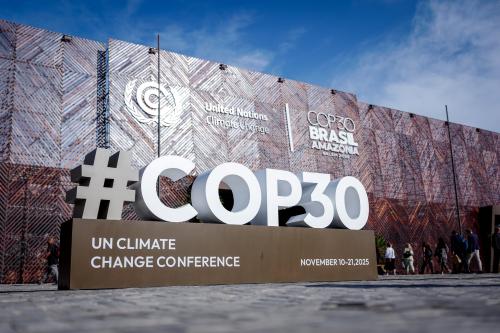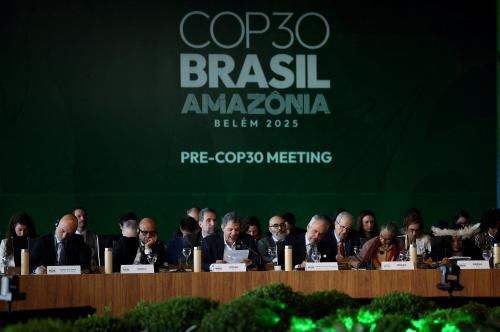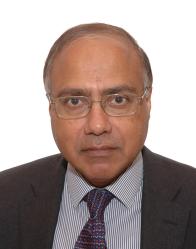The thirtieth Conference of the Parties of the United Nations Framework Convention on Climate Change, or COP30, meets in Belém, Brazil next week. The most urgent challenge is finance: How do we pay for the massive global shift away from fossil fuels and fund essential adaptation projects to cope with a changing climate? To preview COP30, two leading Brookings experts on climate join the show: Samantha Gross is a fellow in Foreign Policy and director of the Energy Security and Climate Initiative at Brookings; and Amar Bhattacharya is a senior fellow with the Center for Sustainable Development in the Global Economy and Development program at Brookings.
Transcript
BHATTACHARYA: These UN affairs are very painful, both in preparation and sometimes in execution, but it gives the world a compass that lasts for a while because, you know, it’s like democracy. A lot of people, debate and bicker and all that. But at the end of the road, there is an understanding that gives us common motivation. And in a similar way, the COP can do that.
[music]
DEWS: Hi, I’m Fred Dews, and this is The Current, part of the Brookings Podcast Network. Next week, the world’s attention turns to Belém, Brazil, for the thirtieth Conference of the Parties of the United Nations Framework Convention on Climate change, or COP30. This annual gathering of nearly 200 countries is the largest global summit for climate action.
This year is critical. Nations must update their key climate promises, known as Nationally Determined Contributions, or NDCs. But the most urgent challenge is finance: How do we pay for the massive global shift away from fossil fuels and fund essential adaptation projects to cope with a changing climate? Can this COP successfully translate its pledges into a clear, implementable roadmap?
To help answer these questions, two leading Brookings experts on climate join the show: Samantha Gross, a fellow in Foreign Policy and director of the Energy Security and Climate Initiative; and Amar Bhattacharya, a senior fellow with the Center for Sustainable Development in the Global Economy and Development program at Brookings, join the show.
And now over to Samantha.
[1:30]
GROSS: Thanks for the introduction, Fred. Amar, this is gonna be a really interesting COP. I have very mixed feelings when I look at it from the energy side, countries are due this time to upgrade their NDCs, their so-called Nationally Determined Contributions, or the things that they promised to bring to the Paris Agreement.
But only like 61 countries covering only about a third of emissions have actually turned theirs in so far, even though the COP is a few days away and these things were supposed to be submitted in February. So it seems to me like countries are kind of dragging their feet a little or unsure what they bring to this COP, at least from the energy transition side. Amar, what are you seeing from your work? In advance of the COP, how are things looking to you?
[2:25]
BHATTACHARYA: So you are absolutely right Samantha, that the NDCs are part of the very fundamental architecture of the COP process because countries come forward with a statement of their ambition, and collectively that determines in some sense both the aspiration for the world, but also the commitments that then countries will implement over the next five years.
So you are right that up to now only 61 countries have submitted. But you will see a flurry in the coming weeks. In the sentiment around the NDCs, it’s important to distinguish between two sets of players. The smaller countries, the more vulnerable countries, are really pressing hard for the larger emitters to step up, because of course if we keep on the path we are, for them it’s an existential issue.
And I had the opportunity to be in New York Climate Week about a month ago when there was a big focus on the NDCs and, you know, we were expecting 30 countries to show up, but 90 countries came to the show. And they were led very much by the sentiment that, you know, we have to step up because, you know, while the politics may be complicated, the reality of science is staring us and we are beginning to see now the prospects of tipping points at a much, much lower level of temperature. So in that context, there’s a huge pressure to step up.
[4:08]
It was also very interesting in New York, the first country to kick off the the commitments on the NDCs was President Xi Jinping from China, and he made this commitment to cut emissions by 7 to 10% by 2035. He also said, But we will strive to do better. We all expect the next Five Year Plan to actually set a more ambitious target, and they committed to helping other countries in meeting the goals of the NDCs.
So the NDC story is not over as yet, Samantha. It’s still very much at play. And I think we will see a lot of focus on measuring what the NDCs are doing, you know, in both in terms of commitment, but also in terms of the real actions that are underpinning them. And certainly the energy piece is absolutely central.
But what is more striking than the NDCs is in reality now, countries are at a moment, you know, serious moment of opportunity in, you know, overachieving the NDCs because of the huge changes that have happened, particularly in the last two years. So we actually have a prospect right now of seeing a huge acceleration in the energy transition not because of the NDCs, but because of the economic opportunity that is now staring us in the face.
[5:42]
GROSS: Yeah, I certainly hope it goes that direction. That would be a change from the past. I mean, the NDCs in the past we’ve sort of had a twofold missing of targets. Not only have the NDCs not been enough to limit temperatures to the degree that we want, but also we’ve seen countries come up short in in making their NDC targets. Sadly the U.S. is is certainly in that category with the changeover in administration.
But I kind of share your optimism in in the energy space and in the industrial space. We have seen the technology get a lot better. And even here in the United States we’re still seeing investments in clean energy and, and investments in clean industry, because they’re the right thing to do and because they make economic sense. And because, you know, even the Trump administration with its, you know, somewhat anti-climate stands, companies understand that it’s only a four year thing, and they’re making decisions that last longer than four years. And so, I have some optimism in that area, like you.
What are some of the big things that you’re looking for at this COP apart from the renewed NDCs? I know that you do a ton of work on finance, and finance is also gonna be a really big deal at this COP.
[6:56]
BHATTACHARYA: Yeah, indeed, finance is a big deal at this COP. At the last COP, there was an agreement on what’s called the New Collective Quantified Goal, a goal to mobilize through public action about $300 billion by 2035 for climate action and emerging markets in developing countries. But an even larger goal of mobilizing $1.3 trillion in total finance, including from the private sector.
But, you know, underpinning that goal is a recognition that this is all a story of investment. That’s the important part about this COP, a recognition that we have an investment imperative, that we have an investment opportunity. That investment and investment opportunity is squarely centered in the clean energy transition. The numbers that we have put forward suggests that we need to invest … emerging markets and developing countries other than China need to invest about $3.2 trillion by 2035. And of that, $2 trillion is the clean energy transition.
The other area, which has really come to the fore, is adaptation and resilience. And what do we see there? We see that every dollar that we invest in resilience gives us a return of $10 to $14. This is the smartest investment that we can make. But we don’t make it, we are in some sense accelerating our own demise because we are making ourselves and the planet more vulnerable. So, and this is true, by the way, here in the United States, it’s true in Europe, everywhere. A real big need to step up on the adaptation and resilience front.
And the third is we recognize now very, very clearly that climate and nature are intricately intertwined. You know, if you fail on one, you will fail on the other. So acting on nature is extremely important, and natural capital is a third place where we will see a lot of emphasis in Brazil. And quite correctly because the lungs of the world are centered in that part of the world.
[9:12]
So all of this requires two things. It requires a systematic approach to investment– unlocking investment at scale, unlocking investment at quality. But the other side is how do you mobilize the financing that is necessary to deliver that investment? And the agenda in this COP is something called the “Roadmap from Baku to Belém,” and the “Roadmap from Baku to Belém” was a mandate given to the COP president to lay out a vision, a strategy and a game plan to deliver the scale of finance that, you know, is called for.
And there are three main kind of outputs that have been produced for the COP in that regard. the culmination of this is the report of the COP30 president, which will come out next week as a precursor to the discussion of leaders and the COP that follows.
The second one is something called a Circle of Finance Ministers. A very important change because it’s a shift from a COP-only approach to a recognition that the finance ministries have a very central role to play in this agenda. They have come out with a report which doesn’t read like anything you have seen in the COP. It reads more like a Brookings report, you know. It’s substantive, it has recommendations, it talks about clear policy elements.
And there’s a third report, which is the report of the Independent High Level Expert Group on Climate Finance, which I co-chair with Nick Stern and Vera Songwe. And what we do in that report is lay out the analytical foundations for the case for strong climate action with this investment imperative and opportunity in mind. And we label it very much as the growth story of the 21st century.
[11:08]
GROSS: Yeah, I, I’m excited to hear your emphasis on resilience and adaptation as well. As we’re talking, Bill Gates has been talking about the importance of climate action as, you know, a way of making people’s lives better and decreasing human suffering. And I see these investments in resilience and adaptation as ways of of doing that. And that that emphasis appeals to me, although he has caught some flak from different directions for emphasizing that.
And it’s also true that for the first time you’ve heard in energy circles and in others, that it looks like the one and a half degree goal is unreachable. But I’m starting to hear that from officials of the United Nations and the UNFCCC. I know that sounds depressing, but I’m actually kind of excited to hear that admission because I think it focuses us on what we need to do, and that we need to focus not just on mitigation of emissions to keep temperatures down, but also on adaptation.
Adaptation is not an admission of defeat. It is an acceptance of the reality that there’s already some climate change baked in. And in order to keep people safe and eliminate suffering, we have to think about mitigation and adaptation. That’s real.
I’ve kind of been thinking about what a successful COP means, because for me at least, there’s, there’s kind of two different COPs going on. And you bring this up a bit with your discussion of the finance ministers, which I agree are hugely important. There’s sort of the negotiation that happens inside the room where it’s very consensus based, and so it’s incredibly important but it’s difficult to be super-duper ambitious when the entire world has to agree.
But COPs have also turned into these giant investment and trade fairs of people coming together, not just national governments, but companies and subnational governments and cutting all kinds of deals and, you know, coalitions of the willing working on what’s possible. And I’m excited to see a successful COP for me would see a lot going on on the outside of the negotiation room on addition to the inside, with various businesses cutting deals and finding ways to finance important things. And so that’s something I’ll be looking for. And what are you looking for out of this COP? What will a successful COP look like to you?
[13:34]
BHATTACHARYA: So let me begin with the first part of what you said, which is the importance of adaptation and resilience, and I completely agree. But let me say that there is no horse race between energy adaptation and resilience and nature. We have to act on all three together. And as I said, the energy one, think of it as opportunity. I mean, let me give the example of Africa. Africa has 60% of the world’s solar potential. If we develop that with the kind of cost of solar we have, less than 8 cents a watt, you know, for Africa, this is not a climate play. It’s the biggest development opportunity they have ever had.
So acting on the energy transition is a development action. That is where I disagree with Bill Gates in his formulation. He understands this completely well. But by presenting it as acting on mitigation and acting on adaptation, a choice one the or the other is not wrong. There’s no trade off. This is totally synergistic.
GROSS: I would argue that there is at some point a competition for funds, though, like that the funding available isn’t unlimited. I mean, they’re certainly spending this investment.
[14:57]
BHATTACHARYA: There’re very different kinds of funding. Let me explain, Samantha. The energy transition is a private sector play today. Okay? It’s not a public sector play. And it pays for itself. All we need is a kind of finance that in some sense has a reasonable cost of capital associated it, and it’ll be self-funding. This is not COP stuff. This is standard economic sense investing. Adaptation and resilience requires long-term and sometimes concessional finance. So we totally agree that take all your concessional finance and focus it on adaptation and resilience. In that sense, there’s no real trade off at the moment between these two. Focus your concessional finance on adaptation resilience, focus it on natural capital. That’s what we argue very strongly in our report.
Second thing that I wanted to pick up is exactly what you said, which is the negotiations have become places for, I would say, you know, directional consensus building, aspirational. I mean, when you look at what was called the Sevilla Commitment, the Financing for Development Conference that happened, you know, in Sevilla at the end of June. These UN affairs are very painful, both in preparation and sometimes in execution, but it gives the world a compass that lasts for a while because, you know, it’s like democracy. A lot of people debate and bicker and all that. But at the end of the road, there is an understanding that gives us common motivation. And in a similar way, the COP can do that.
We also need to shift the the COP from the wrangles of the past, particularly around finance to, as I said, the moment of opportunity and investment of the future.
Will we succeed in the COP on that? I don’t know. But we’ll certainly succeed outside the room. Many, many gatherings that are happening around bringing the private sector together. You will see that we probably have more activity outside the room than there is in the room.
But we do hope we can land this “Roadmap from Baku to Belém” as a kind of a, you know, a vision, a strategy, a coming together around exactly what you said. Let’s do what we can with what we have. And you know, it’s, this is about real ambition. How do we get that ambition?
[17:29]
GROSS: Yeah, I mean, I completely agree with you. This idea of of particularly reworking the energy system as an investment opportunity is is incredibly important. And even here in the United States, we see it moving forward in places you might not expect because these investments make business sense. And I I often say that once you make it a good business opportunity to fix a problem, you can’t stop businesses from fixing it. And so the the optimism that I have all comes from that.
So, Amar, this has been a terrific conversation. It’s been really good to talk to you and and learn what you’re looking forward to in the upcoming COP
BHATTACHARYA: Thank you, Samantha. We will all take stock after November 20th.
GROSS: I look forward to catching up then. And, thanks also to our listeners.
[music]
DEWS: You can learn more about Samantha Gross, Amar Bhattacharya, and our research on climate at Brookings dot edu.
More information:
- Listen to The Current on Apple, Spotify, YouTube, or wherever you like to get podcasts.
- Learn about other Brookings podcasts from the Brookings Podcast Network.
- Sign up for the podcasts newsletter for occasional updates on featured episodes and new shows.
- Send feedback email to [email protected].
The Brookings Institution is committed to quality, independence, and impact.
We are supported by a diverse array of funders. In line with our values and policies, each Brookings publication represents the sole views of its author(s).








Commentary
PodcastCan the COP30 climate conference achieve its goals?
Listen on
The Current Podcast
November 6, 2025